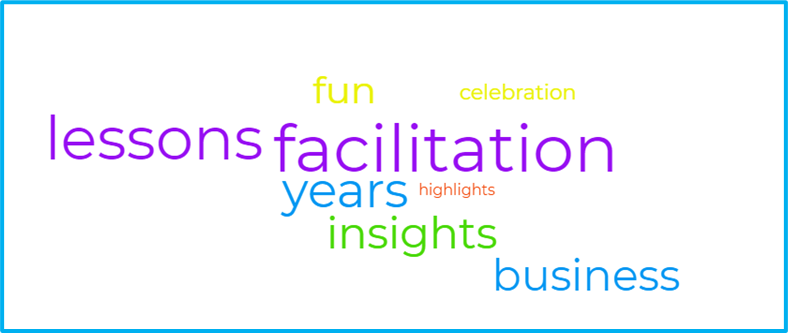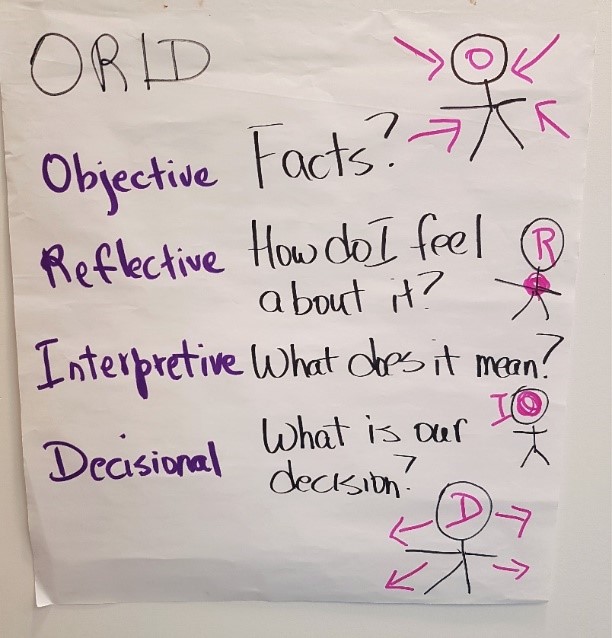On June 1st, I celebrated the 28th anniversary of my facilitation company. So many memories, highlights, ups and downs, and lessons. And I thought, why wait for the milestone of 30 years in business to share my experiences? I hope that these musings will help anyone who is in the process of starting, building, or maintaining an entrepreneurial business. I write specifically about my facilitation business yet, the lessons can be applied to any business endeavour.
My first career was in parks and recreation, managing departments with municipal governments in Alberta, Canada. While I loved this work, I realized over the 16 years in these positions, that what I enjoyed the most was working with people. I hosted and facilitated community meetings, managed teams, and designed and led leadership training workshops. When my last recreation department and my position were eliminated in 1994 by the council, I knew I wanted to start my own consulting business focused on facilitation.
It was incredibly scary and nerve-wracking to leave the security of a paid position. A friend gave me the book “Even Eagles Need a Push” by David McNally. It and my husband gave me the incentive to leap out of the nest. I’ve never looked back.
28 years later, here I am!
I am frequently asked for advice by individuals who wish to start a facilitation business. Here is what I tell them.

You are your reputation. Don’t fake it. Obvious yet essential to say. Know your values. Behave with integrity. Be authentic. Honour your commitments. Give your best.
Integrity is highly important when accepting work that you are offered. Take work you know you can provide or refer to a colleague with the required expertise. When I take on work that I am not good at, I feel a tickling in the back of my neck. I know that I am faking it and will not produce great work and benefits for the client. I then say, “No” and refer the person to a colleague or other resources. This is hard to do when I need money, however, I know that the project would likely end unsatisfactorily for the client and me.
- A story: I was asked last week to facilitate a highly engaging and fun team-building day for 90 participants. The client wanted games, competitions, and novel experiences. While I facilitate fun activities as part of workshops, my skill is building a team through dialogue, decision-making, and the application of ideas to the work environment. I knew I did not have the experience that the client wanted. I contacted a colleague who specializes in games for teams and referred her. I asked if I could help so a win for me, her, and the client.
- A 3rd option: There is an option other than accepting or referring the work. If the work is similar to what you know, talk with the client about how you could learn more about it and collaborate on the best way for you to deliver. Often, a client has a great working relationship with you and would prefer you to conduct the work even if it is slightly outside your typical services. I have facilitated extensively with the ALS Society of Alberta. When they needed a review of the equipment program they offer clients, they asked me to design it with them, facilitate input sessions and interviews with staff and stakeholders, and synthesize the information for them. They said that they had the expertise to assess the information and trusted me to use my facilitation skills to gather it and report about it.
It’s about the people you work with – and you. Think of your clients. Who are they? Why are they participating in this session or meeting? What do they want to achieve and experience? Why are they asking you? How can you help them? What and how can you contribute?
- A story: A turning point for a new facilitator is when her attention is turned away from herself to the clients. How do we know when this occurs? We stop worrying about, “Will they like me? How will I come across to the group? Will I remember what to do?” Rather, we think about the participants in the meeting, workshop, or conference. I always imagine that I am a participant and think about how I would feel as I prepare to attend the session.
Be YOU. Build your business around your strengths, skills, passions. Do what you are good at, what you love, what the world needs, and what you can make money by doing. This could be your WHY statement as per Simon Sinek https://simonsinek.com/ or your purpose statement as you develop a business plan or what you would like to have said about yourself after you die. It might be how you leave the world a little bit better through your work.
- A story: Throughout my career, I have used the Purpose Venn Diagram as described in the resources below as my guide. I use four questions based on the Purpose Diagram to inspire, plan, and assess my business and decide which work I will agree to provide.
- What do I love? (passion)
- What am I good at? (vocation, competencies)
- What does the world need? (mission, calling)
- How can I make money doing this? (profession, livelihood)
- Resources: The creation of the Purpose Diagram is credited to Andrés Zuzunaga, a Spanish astrologer. https://www.cosmograma.com/andres-zuzunaga.php. This Purpose Diagram is often erroneously interlinked with the Japanese concept of Ikigai as explained in this article. https://ikigaitribe.com/ikigai/ikigai-misunderstood/. Another resource for the Purpose Diagram is http://www.humanbusiness.eu/purpose-venn-diagram/.
Facilitation is much more than techniques. Many new facilitators start their work by only learning techniques. Don’t stop there. Being able to facilitate a fun opening activity or a simple discussion is only one aspect of the profession. We need a firm base to build techniques upon. Define your beliefs and philosophies for facilitation. Seek out, learn, and practice one or two solid approaches which are founded in philosophy and principles and use them for design and facilitation with your clients.

- My story and resources: My foundation is the Technology of Participation (ToP) approach which I learned from ICA Associates https://ica-associates.ca/ and still use after 28 years. Fourteen years into my business, I learned The Skilled Facilitation through training with Roger Schwarz https://www.schwarzassociates.com/ and integrated it into my foundational approach. From these two resources, I use the ORID Focused Conversation and the Mutual Learning Approach to hold exploratory conversations with clients, plan and design the sessions, and figure out what is happening in the session when things seem to be off-track.
- https://www.schwarzassociates.com/what-is-the-mutual-learning-approach/.
Understand the competencies of facilitation and use them as a way to assess your work, gain feedback from clients, and strengthen your skills.
- My story and resources: I use the core competencies of the International Association of Facilitators. https://www.iaf-world.org/site/professional/core-competencies. I printed them and posted them above my computer monitor. They keep me centred as I talk with clients about what they wish to gain from a session. They calm me as I know that, by referring to them, I will not forget any aspect of design.
Enhance your work! Experiment, innovate, adapt. I use various methods to enhance my foundational approach. These include Open Space, Appreciative Inquiry, World Café, Liberating Structures, and the Circle Way. Search these methods and enjoy the richness you will find.

Get by with a little help from your friends. Use your circles of friends, colleagues, co-workers, and acquaintances to find clients, promote your business, learn from, and collaborate. My university friends still hire me as a facilitator. Through the move to the online forum, I have gained colleagues who are starting their careers and I learn much from them and am referred to new clients.
- My oops story! In the first few years of my business, a close friend who was the Executive Director of a large nonprofit organization, told me about a series of focus groups for which he had recently hired a facilitator. I said to him, “That’s what I do.” He said he had no idea. I learned that I had to speak up, “blow my horn”, tell my friends and colleagues, and not assume that they would know my services.
Collaborate. Join facilitator networks, co-facilitate with colleagues, and volunteer. Join professional associations, particularly the International Association of Facilitators (IAF) https://www.iaf-world.org/site/ I have found unparalleled support, a wealth of information, and camaraderie through my IAF membership.
Extend a helping hand. I informally and formally mentor new facilitators. I enjoy coffee meetings with individuals who want to hear how I started my facilitation business, what I have learned, and what I suggest. The International Association of Facilitators has a formal mentoring program and I enjoy helping individuals who, as mentees, teach me as much as I teach them. When a colleague contacts me for advice, I offer as much support as I can.
Keep learning. Go to conferences, and join online and in-person networking groups. Covid was an incredible time of growth for me. At 26 years of my business, and with only facilitating online for several contracts about ten years previously, I had to learn virtual facilitation. I participated in every free or nominal charge session I could find about virtual facilitation. I learned through online tutorials from Zoom and MS Teams and other platforms. I participated in more expensive, longer training workshops. I practiced with colleagues, family, and friends. I offered free two-hour facilitation sessions for my clients. I love online facilitation and hope that my business continues to be a 50/50 combination of in-person and virtual.
Best of times; worst of times: the cycle of work and money. Understand, accept, and prepare for times of high work, high income; low work, low income. I found that in the first three years, I have low work periods every six months. By ten years, it stretched out to two or three years. Currently, the cycle fluctuates as Covid continues to affect organizations. I experience low work periods approximately every eight months.

If possible, find a work experience that becomes an ongoing part of your business. For 25 years, I have written funding proposals for two organizations through an annual contract. The work is highly interesting and challenging, requires conversations with great individuals, and provides a guaranteed income to supplement my facilitation work. It has also led to the organizations booking me for many facilitation contracts and referring me to many clients.
- My story: In my 28 years, two significantly low times stand out: the 9-11 World Towers attack and the Covid-19 pandemic which started in March 2020. After 9-11, business dropped about 75% as some of the nonprofit and business organizations seemed to move into an austerity mindset and cancelled sessions. This is when a long-term relationship came into play. A colleague who was also a client contracted me to run a project for her organization. It was interesting work, and while at a much lower rate than what I typically charged, it gave me income during an uncertain time. When Covid started, I had three months of about 25% income. Fortunately, the ongoing work writing funding proposals gave me income until clients switched to online sessions. Within seven months of Covid, my income was back to a flourishing level.
Get a great accountant. File your taxes! Keep good business books or hire someone to do them.
Define and instill balance in your life. This is hard for me. I love my work. Fortunately, I value family first and design my workflow around my husband, children, grandchildren, and extended family. I value my health. I am physically active every day. I practice yoga, go for long walks, and bike ride and hike on weekends. I read books, walk and talk with friends, and play with my children and grandchildren. A four-year-old child reminds you of what is important! You are a better facilitator when you are healthy, happy, relaxed, and loved.
And yes, I plan to celebrate 30 years by remaining an active and contributing facilitator.
